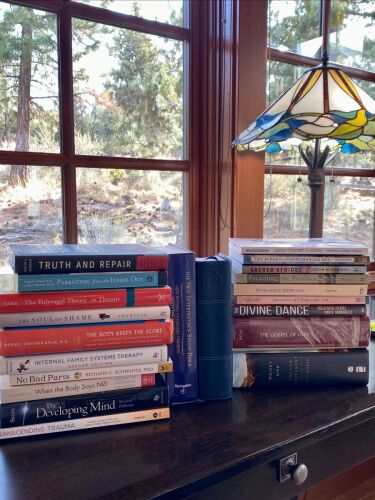 Do you remember the last time you believed something awful about yourself?
Do you remember the last time you believed something awful about yourself?
Perhaps someone you love was disappointed in you. Or, you expressed a need, and you were ignored. Maybe you mustered up the courage to disagree, to take a stand for something you value, and you were shut down. Sometimes you enter a conversation knowing it’s vulnerable, and other times you’re blindsided by a reaction that sends you spinning.
When you take the risk to be vulnerable, and it doesn’t go well, you will likely hear the voice of a part of you who believes that you are defective or flawed in some irredeemable way.
“I’m such an idiot. I never do anything right.”
“Clearly, I’m worthless. That’s why my needs don’t matter. I’m only worth something if I’m taking care of someone else’s needs.”
“If I were lovable, they wouldn’t treat me like that.”
Whatever the words, the underlying belief is, “It’s my fault; something is fundamentally wrong with me.” You might hear a whisper or a shout. It always hurts, and it always provokes a reaction – inside and from others. Shame wells up, and your body tenses. You want to run and hide. How can you get relief from this pain?
The most common strategies are not helpful.
You don’t have to search very far to find advice about what to do with painful beliefs. In therapeutic settings, it’s still widespread to challenge them. If you’ve ever tried this strategy, you know it doesn’t work. We can understand these beliefs are irrational, but knowledge alone does not help us release them.
In Christian circles, you are likely to hear a Bible verse cherry-picked for the occasion. The message: the belief is a “lie.” A favorite verse to quote is “…take captive every thought and make it obedient to Christ” (2 Corinthians 10:5). The vivid imagery in this verse is appealing if the assumption is the belief is a lie that we should wrestle into submission. I think that’s why it’s so often misused. The verse has nothing to do with the thoughts we believe about ourselves (based on the context and audience), but that does not stop people from rushing to share it.
There must be a better way.
Jesus casts a vision that guides us to healing. He announced his ministry with a beautiful statement that includes the intention “to set the oppressed free” (Luke 4:18-19). But, unfortunately, the parts of us who hold these painful beliefs are like inner captives, cut off because their misery threatens our well-being. We typically decide the most painful things about ourselves when we’re young because our immature brains cannot fully process difficult experiences. So if something terrible happens, the meaning we make is, “it’s my fault because I’m defective.” And there are many different ways to describe defectiveness: not good enough, unlovable, and worthless are, sadly, very common.
When you realize a vulnerable, young part of you is the one holding the belief, your heart will soften.
Turn toward her with curiosity and compassion. Instead of wrestling with her, hug her and listen to the story she tells about what happened. Then, after she has a chance to tell her story, you can provide the adult perspective she needs.
In considering the usefulness of secular or spiritual approaches, the focus should be on respecting and validating the experiences of our most vulnerable inner family members. This verse is a much more appropriate guide: “Now I will show you a more excellent way (1 Corinthians 12:31),” the way of love. Healing happens through loving relationships with members of your inner family, especially the ones holding painful beliefs.




Leave A Comment